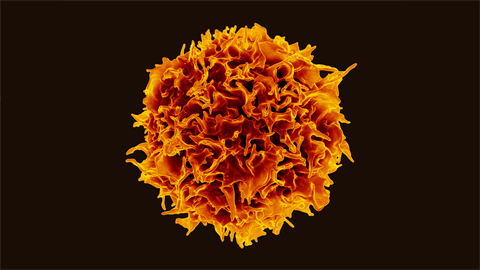Breakthrough Therapy Boosts Immune System’s Fight Against Skin Cancer
An international research team has demonstrated a method to identify the cells in the immune system that can recognize and fight cancer cells in samples from 9 out of 10 patients affected by the rare but aggressive form of skin cancer, Merkel cell carcinoma. The results of the research have been published in The Journal of Clinical Investigation and may eventually open up new forms of immunotherapy in the treatment of people with Merkel cell cancer.
The research project was conducted by an international team of researchers from universities and hospitals in the US, Germany, Denmark and was led by Professor Sine Reker Hadrup from DTU.
The researchers have identified the elements in Merkel cell polyomavirus, known as epitopes, that can be recognized by the immune system’s T cells. Merkel cell polyomavirus is directly implicated in the development of Merkel cell cancer. Normally, the immune system is able to recognize and defeat these epitopes, but in elderly and immunocompromised patients in particular, this response is impaired. In trials, researchers have shown that patients’ ability to mount an immune response against these elements determines how effective immunotherapy is in treating their skin cancer.
Building on previous treatment trials, the researchers are now working to further boost the immune response in patients with Merkel cell carcinoma, and they have shown that they are able to generate large numbers of the desired T cells – even in patients who normally have none.
In the trials, the researchers used a known treatment principle of blocking a channel in the immune system, known as immune checkpoint blockade. The treatment principle was awarded the Nobel Prize in Medicine in 2018 and is now a widely used treatment strategy for many cancers. The treatment involves blocking the so-called PD1 receptor – a structure that normally slows down the immune system’s T cells after an infection in the body.
Boosting the body’s immune system
In the laboratory experiments, the researchers take T cells from patients and mix them with a nanostructure that they have designed to stimulate the immune system’s T cells against the very elements of the Merkel cell polyomavirus that are involved in cancer formation. In this way, the researchers can create a large number of the T cells that are capable of killing cancer cells. The method is based on a DTU-patented technology – an expansion strategy for T cells – developed by Sine Reker Hadrup.
“In the trial, we show that the expansion strategy for immune cells that can fight Merkel cell cancer is relevant for people with this type of cancer. We have designed some molecular structures that contain a number of different molecules that can activate the reaction in the immune system that can defeat the cancer cells,” says Sine Reker Hadrup.
Sine Reker Hadrup believes that the next step in the research is to conduct a larger study and then use the results in a trial treatment with patients. In the longer term, the research results open up the possibility of developing the treatment into a new type of immunotherapy for patients with Merkel cell cancer.

